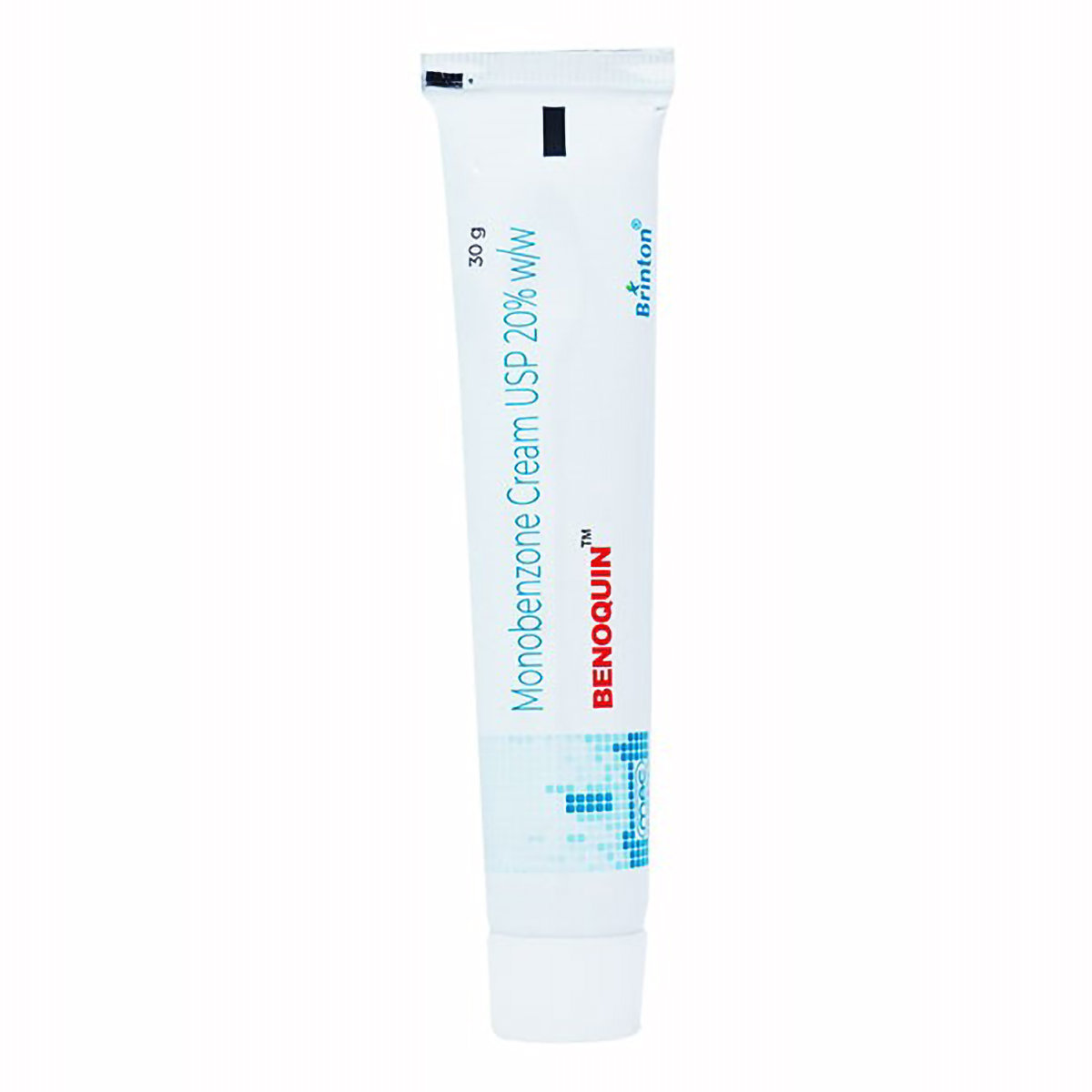Monobenzone
About Monobenzone
Monobenzone contains a topical depigmenting agent indicated for the final depigmentation in extensive vitiligo. It is used to lighten skin in people with vitiligo permanently. Vitiligo is a disease that causes loss of skin colour in blotches.
Monobenzone contains Monobenzone that works by increasing the elimination of melanin (pigment molecules) from skin cells. It depigments darker areas around the areas of vitiligo and helps even out the colouring and appearance of the skin.
In some cases, Monobenzone may cause mild skin irritation, dryness or flaking of treated skin. Most of these side effects do not require medical attention and will resolve gradually over time. However, if the side effects persist or worsen, consult a doctor.
Do not use Monobenzone if you are allergic to any of its components. Consult the doctor if you are pregnant or breastfeeding. Monobenzone is not recommended for children. Keep the doctor informed about your health condition and medications to rule out any side effects/interactions.
Uses of Monobenzone
Medicinal Benefits
Monobenzone contains Monobenzone, a topical depigmenting agent indicated for the final depigmentation in extensive vitiligo. It is used to lighten skin in people with vitiligo permanently in patients with disseminated (greater than 50 per cent of body surface area) idiopathic vitiligo. Monobenzone works by increasing the elimination of melanin (pigment molecules) from skin cells. It depigments darker areas around the areas of vitiligo and helps even out the colouring and appearance of the skin.
Directions for Use
- Monobenzone is usually applied two to three times a day; however, follow your doctor’s instructions regarding the dosage and duration.
- Apply a thin layer of Monobenzone to the pigmented skin areas and rub in gently.
- Wash your hands before and after applying Monobenzone. Make sure that the affected area is clean and dry before application.
Storage
Side Effects of Monobenzone
- Mild skin irritation
- Dryness or flaking of treated skin
Medicines Containing this Salt
View AllDrug Warnings
Do not use Monobenzone if you are allergic to any of its components. Monobenzone is not recommended in Berloque dermatitis (hyperpigmentation caused by photosensitisation following the use of certain perfumes), freckling, melasma of pregnancy, malignant melanoma, hyperpigmentation resulting from inflammation of the skin, or pigmentation resulting from pigments other than melanin (artificial pigments, bile, silver). Consult your doctor if you are pregnant or breastfeeding. This medicine should not be used in children below 12 years. Let your doctor know if you are taking any prescription/non-prescription medicines, including supplements or herbal products.
Drug Interactions
Drug-Drug Interactions: No interactions found/established.
Drug-Food Interactions: No interactions found/established.
Drug-Disease Interaction: No interactions found/established.
Drug-Drug Interactions Checker List:
Safety Advice

Alcohol
consult your doctorIt is not known whether alcohol interacts with Monobenzone. Please consult your doctor.

Pregnancy
cautionMonobenzone belongs to pregnancy category C. Monobenzone should be used during pregnancy only if clearly needed.

Breast Feeding
cautionIt is not known if Monobenzone passes into breast milk. Caution should be exercised while administering Monobenzone to a nursing woman.

Driving
not applicable-

Liver
consult your doctorLimited data is available. Please consult your doctor if you have concerns regarding the usage of Monobenzone in patients with liver impairment.

Kidney
consult your doctorLimited data is available. Please consult your doctor if you have concerns regarding the usage of Monobenzone in patients with kidney impairment.

Children
unsafeMonobenzone is not recommended for children below 12 years as the safety and effectiveness have not been established.
Habit Forming
Diet & Lifestyle Advise
- Eat a healthy diet and drink lots of water.
- Include foods rich in antioxidants and omega-3 fatty acids like whole grains, walnuts, seaweed, and mackerel.
- Avoid processed meat, refined grains, sugar-sweetened beverages, and fried foods.
- Reduce stress by doing yoga or meditation.
- Nutrient-rich foods like vegetables, fruits, whole grains, seeds, nuts, legumes, and lean protein may help promote good health and limit inflammation.
Special Advise
- Always remember to wear sunscreen as the skin treated with Monobenzone may be sensitive to sunlight for the rest of your life.
Patients Concern
Disease/Condition Glossary
Vitiligo: Vitiligo is a disease that causes loss of skin colour in blotches. It occurs when the pigment-producing cells called melanin die or stop functioning. Vitiligo is generally considered to be an autoimmune disorder (the immune system attacks the body's own tissues and organs). It can affect any part of the skin; however, it mostly occurs on the face, neck, creases, and hands.
FAQs
Monobenzone is used to treat Vitiligo.
Monobenzone works by increasing the elimination of melanin (pigment molecules) from skin cells.
Skin treated with Monobenzone may become sensitive to sunlight and make you sunburn more easily. Therefore, avoid exposure to tanning beds and sunlight. Also, use sunscreen and wear protective clothing when outdoors.
Monobenzone is a potent depigmentation agent and not a cosmetic bleach. It should not be used in any other conditions except for disseminated vitiligo.
Monobenzone may also change the colour of untreated skin. Consult your doctor if you have concerns about depigmentation of other skin areas unaffected by vitiligo.
Monobenzone may cause side effects like mild skin irritation, dryness or flaking of treated skin. Most of these side effects do not require medical attention and will resolve gradually over time. However, if the side effects persist or worsen, consult a doctor.
No, Monobenzone does not cause vitiligo. In fact, it is used to treat vitiligo.
No, Monobenzone is not recommended for the treatment of melasma. It is used to treat melasma.


